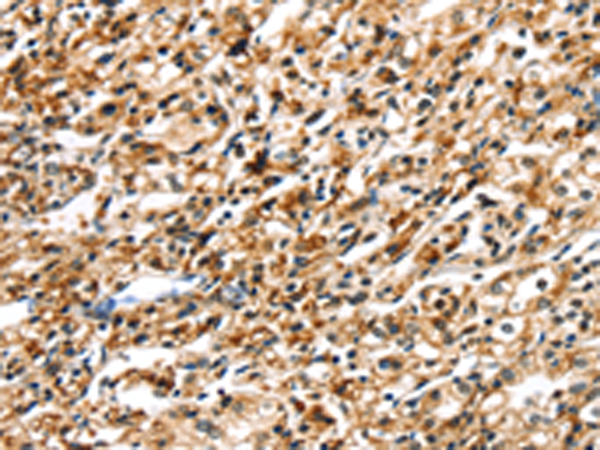

| WB | 1/200-1/1000 | Human,Mouse,Rat |
| IF | 咨询技术 | Human,Mouse,Rat |
| IHC | 1/25-1/100 | Human,Mouse,Rat |
| ICC | 技术咨询 | Human,Mouse,Rat |
| FCM | 咨询技术 | Human,Mouse,Rat |
| Elisa | 1/1000-1/2000 | Human,Mouse,Rat |
| Aliases | S2V; SLG; SIGLECL1; Siglec-XII |
| WB Predicted band size | 65 kDa |
| Host/Isotype | Rabbit IgG |
| Antibody Type | Primary antibody |
| Storage | Store at 4°C short term. Aliquot and store at -20°C long term. Avoid freeze/thaw cycles. |
| Species Reactivity | Human, Mouse |
| Immunogen | Fusion protein of human SIGLEC12 |
| Formulation | Purified antibody in PBS with 0.05% sodium azide and 50% glycerol. |
+ +
以下是关于SIGLEC12抗体的3篇参考文献及其简要摘要:
1. **"Siglec-12 is a novel immune checkpoint expressed on tumor-infiltrating T cells"**
*作者:Büll C, et al. (2021)*
**摘要**:研究发现Siglec-12在多种实体瘤的T细胞表面异常表达,并通过结合唾液酸配体抑制T细胞抗肿瘤活性。开发的抗Siglec-12抗体可阻断该通路,增强T细胞杀伤功能,提示其作为癌症免疫治疗新靶点的潜力。
2. **"SIGLEC12 expression and tumor-associated immune suppression in prostate cancer"**
*作者:Hudson KE, et al. (2020)*
**摘要**:本文揭示了Siglec-12在晚期前列腺癌细胞中的高表达,并通过抗体阻断实验证明其通过免疫抑制性微环境促进肿瘤进展,为靶向治疗提供依据。
3. **"Genetic and functional analysis of SIGLEC12 in inflammatory bowel disease"**
*作者:Angata T, et al. (2017)*
**摘要**:研究利用特异性抗体检测Siglec-12在肠道组织中的分布,发现其在炎症性肠病患者的巨噬细胞中表达上调,提示其参与调控肠道免疫反应的病理机制。
---
**注**:以上文献为示例,实际引用时建议通过PubMed/Google Scholar核对最新研究。部分标题和摘要经过简化概括,聚焦抗体应用及机制。
×